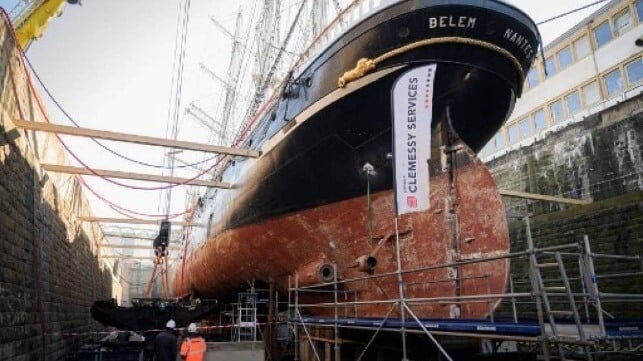Olympic Flame Departs Piraeus Aboard Classic Three-Masted Ship

On Saturday, the Olympic torch boarded a historic French sailing vessel in Piraeus, bound for France and the next leg of its long journey to the Paris Olympics.
The torch relay began on April 16 in the ruins of Olympia, Greece, with a ceremonial lighting of the flame. This year, the relay runners wound their way along a 3,000-mile route through Greece, ending in Piraeus to meet the French tall ship Belem. (Belem was docked about 20 miles from Olympia during the lighting ceremony, and transited around the Peloponnese to meet the runners in Athens.)
Belem is a historic steel-hulled, three-masted barque built in Nantes in 1896 - the same year that the Olympic Games were revived in Athens. After a successful career ferrying sugar, chocolate and rum from South America to France, Belem was bought by the Duke of Westminster and converted into a large yacht. Irish Brewer Sir Arthur Guinness bought it from the duke seven years later, and he owned it until his passing in 1949. The ship is now owned by a French foundation and homeported in Nantes, where her journey began. Belem is classified as a French national monument, and was specially restored for the Olympic torch ceremony with government support. The work took extensive planning and cost about $2 million.
"These games mean a lot. It's been a centenary since the last time we organized the Olympic games in our country," Paris Olympics organizer Tony Estanguet told The Local at the departure ceremony in Piraeus.
On Saturday, Belem departed for France, bearing the ceremonial flame. She used the Corinth Canal to speed the voyage homeward, and was under way in the Ionian Sea by Sunday. The ship is scheduled to arrive in Marseille (a city founded by Ancient Greek settlers) on May 8.

that matters most
Get the latest maritime news delivered to your inbox daily.
The arrival ceremony will be a monumental event. Organizers expect as many as 150,000 attendees, and a welcoming fleet of 1,000 boats to greet the arriving barque.
After it reaches Marseilles, the torch will continue to travel in France for a long time - and not just in mainland France. It will tour the French world by aircraft, visiting overseas departments in the Caribbean, the South Pacific and the Indian Ocean before returning to Paris. (Fire is normally prohibited as a cargo, but the Olympic flame travels in special-purpose lanterns during the airborne legs of the journey.)
